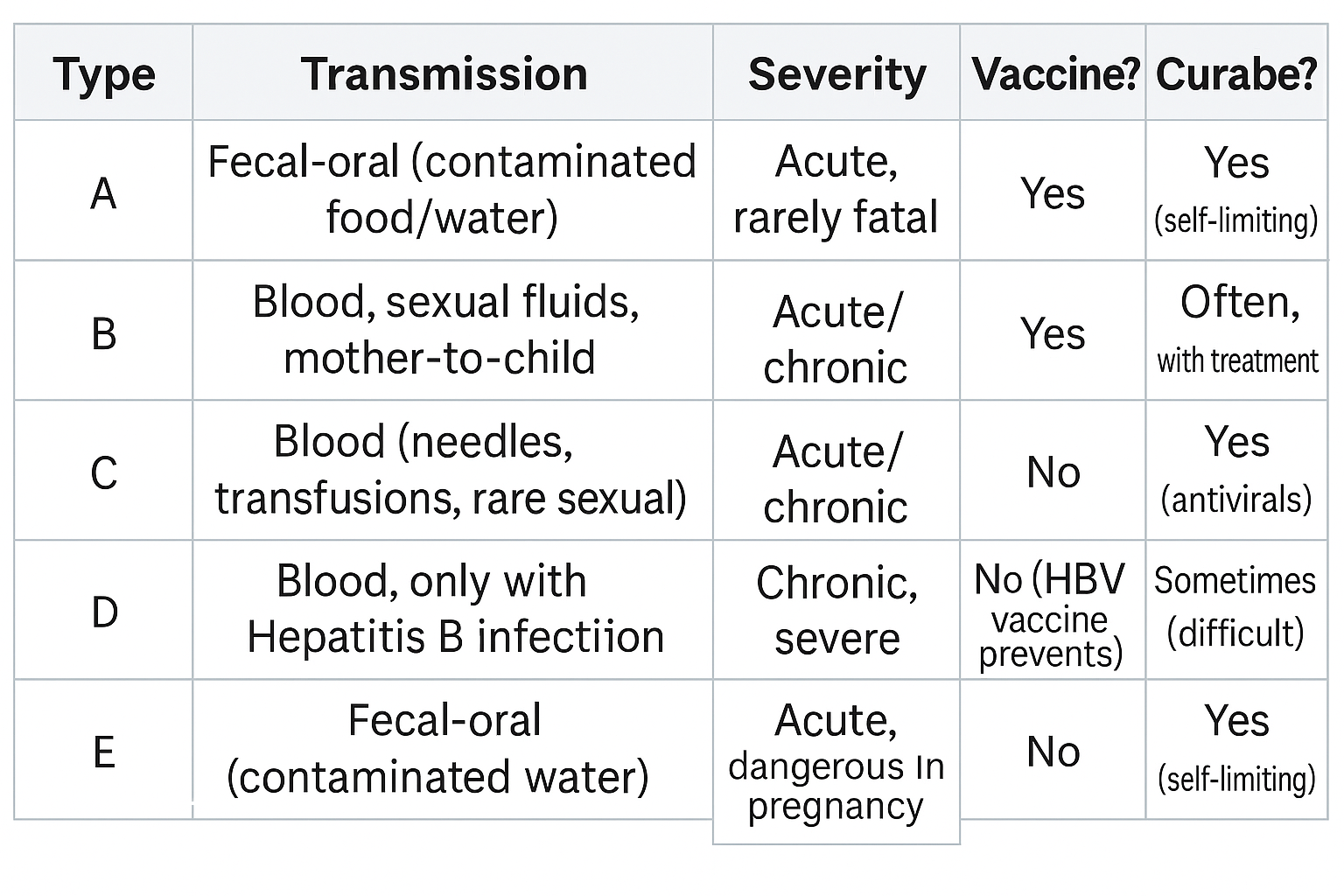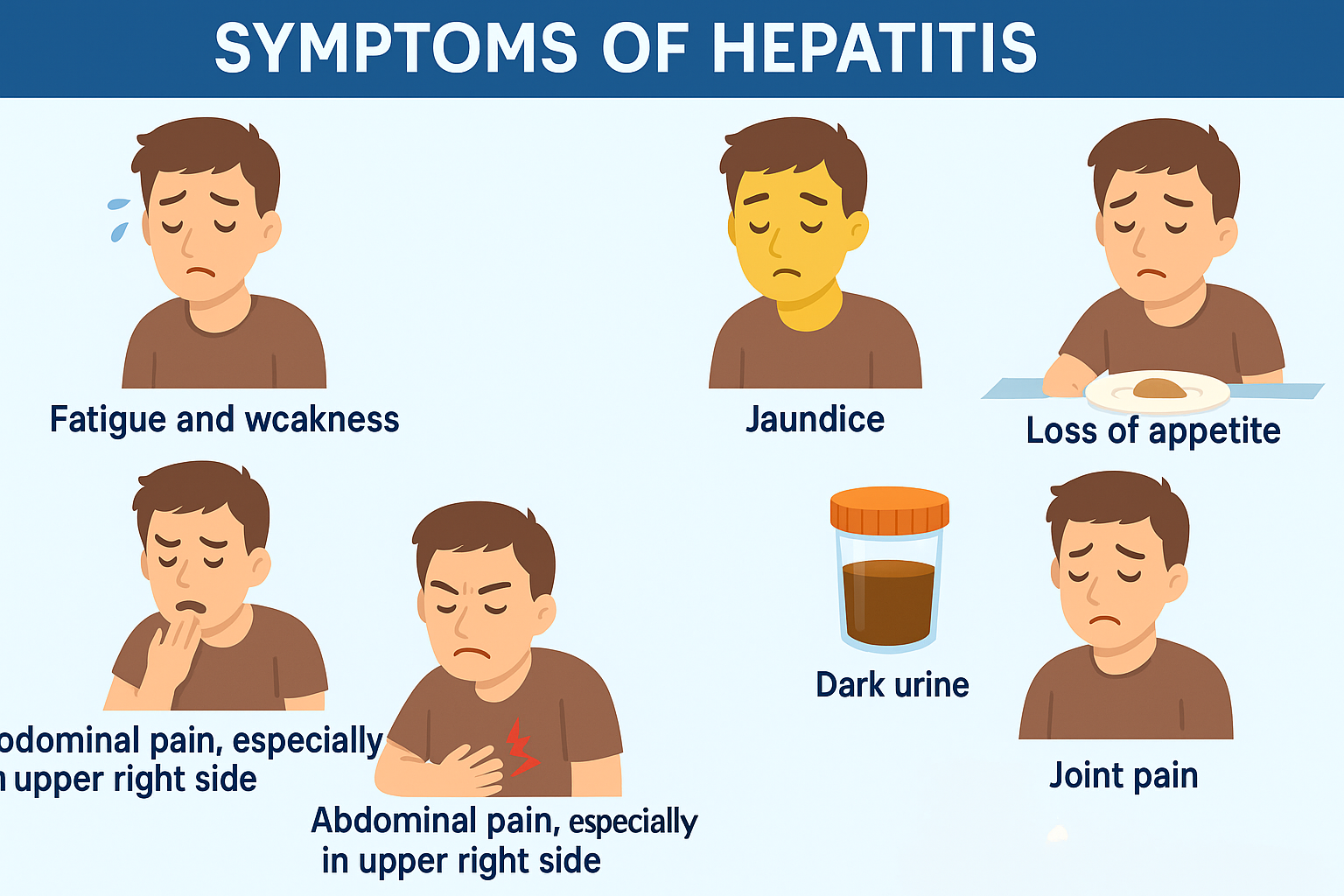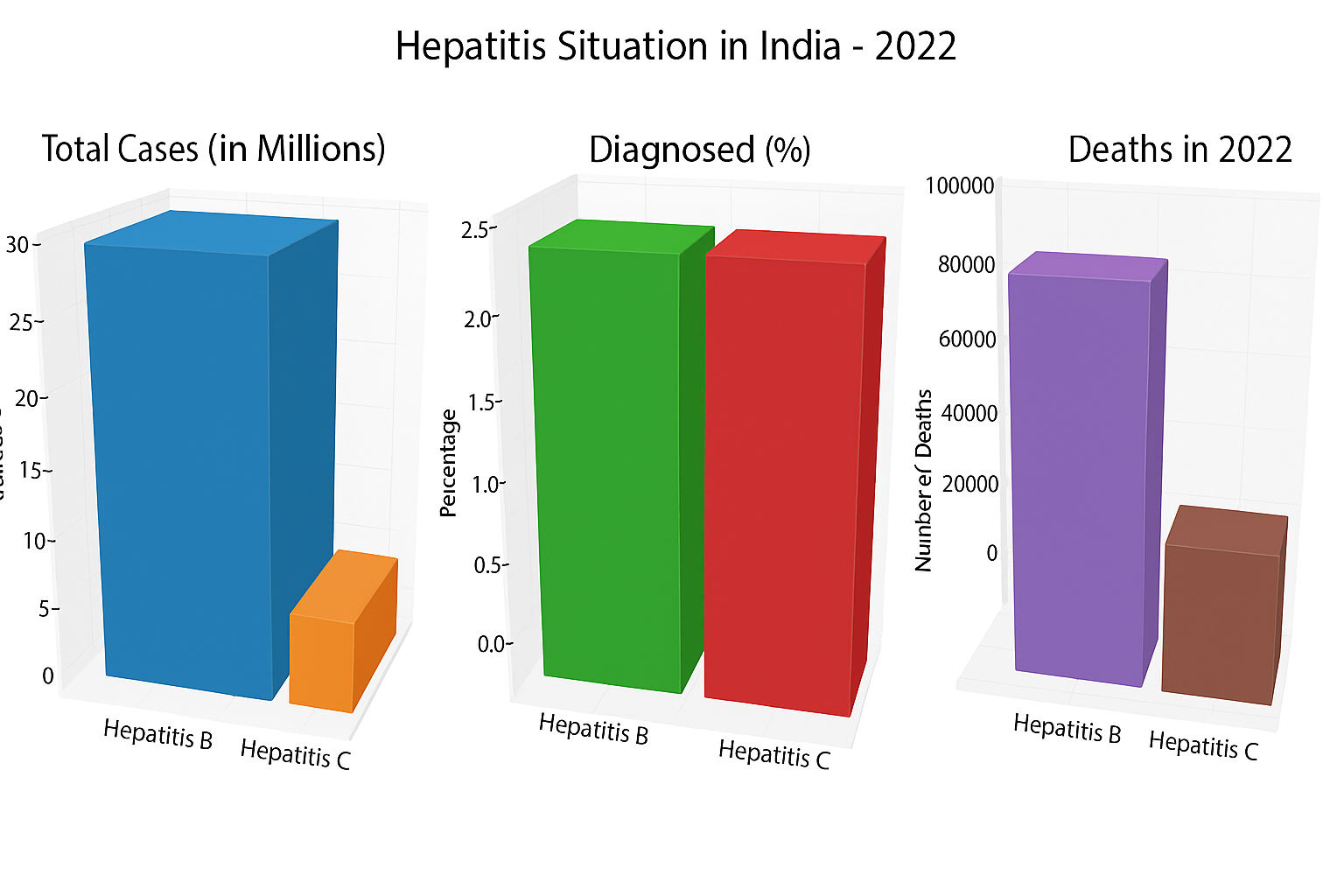Imagine living with a life-threatening disease for years without a single clue. This is the reality for over 300 million people worldwide who carry viral hepatitis, most of them completely unaware. Every day, hepatitis quietly claims 3,500 lives globally, making it one of the world’s deadliest infectious diseases. Yet, for many, the word “hepatitis” barely registers as a health concern. This is the paradox of hepatitis: a silent killer that often strikes without warning, progressing beneath the surface until irreversible liver damage, cancer, or even death becomes inevitable.
Why is hepatitis so dangerous? Because it can be asymptomatic for years, quietly damaging the liver until it’s too late for effective intervention. The aim of this blog is to expose the silent threat of hepatitis, explain its types, causes, symptoms, and complications, and most importantly empower you to take action before it’s too late.
Table of Contents
- Introduction
- What is Hepatitis?
- Types of Hepatitis: Know the Differences
- Why It’s Called a Silent Threat
- Symptoms to Watch Out For
- Complications of Untreated Hepatitis
- Prevention is Possible
- Diagnosis & Treatment
- Hepatitis in India: A Regional Focus
- Call to Action: Don’t Wait Until It’s Too Late
- Why Choose MASSH Hospital for Hepatitis Care?
What is Hepatitis?
Hepatitis means inflammation of the liver. The liver is a vital organ, responsible for processing nutrients, filtering toxins, and supporting metabolism. When it becomes inflamed, its ability to function is compromised, leading to a cascade of health problems.
Hepatitis can be caused by:
- Viruses: The most common cause, with five main types A, B, C, D, and E.
- Alcohol: Excessive drinking can inflame and scar the liver.
- Autoimmune diseases: The body’s immune system attacks liver cells.
- Toxins and drugs: Certain medications, supplements, and chemicals can damage the liver.
While all forms of hepatitis involve liver inflammation, viral hepatitis is the most widespread and dangerous, especially due to its potential to become chronic and lead to life-threatening complications.
Types of Hepatitis: Know the Differences
Understanding the types of hepatitis is crucial for prevention and management. Here’s a comparative overview:
 Hepatitis A and E are usually acute and transmitted through contaminated food or water. They rarely cause chronic liver disease but can be severe in certain populations.
Hepatitis A and E are usually acute and transmitted through contaminated food or water. They rarely cause chronic liver disease but can be severe in certain populations.- Hepatitis B, C, and D are blood-borne and can become chronic, leading to long-term liver damage.
Why It’s Called a Silent Threat
Hepatitis is often dubbed a “silent killer” because:
- Lack of Early Symptoms: Most people with chronic hepatitis B or C experience no symptoms for years or even decades.
- Common Misdiagnosis: When symptoms do appear, they are vague fatigue, mild abdominal pain, or flu-like illness easily mistaken for less serious conditions.
- Silent Liver Damage: The virus can quietly destroy liver cells, leading to scarring (cirrhosis) or cancer, often before the person ever feels unwell.
This silent progression means that by the time hepatitis is diagnosed, irreversible liver damage may have already occurred.
Hepatitis Symptoms to Watch Out For
When hepatitis finally becomes symptomatic, it often signals significant liver involvement. Common symptoms include:
- Fatigue and weakness
- Jaundice (yellowing of the skin and eyes)
- Nausea and vomiting
- Loss of appetite
- Abdominal pain, especially in the upper right side
- Dark urine
- Pale or clay-colored stools
- Joint pain
- Fever (especially in acute hepatitis)

These symptoms are not unique to hepatitis and can be easily overlooked. That’s why routine screening is so important, especially for those at higher risk.
Complications of Untreated Hepatitis
Without timely diagnosis and treatment, hepatitis can lead to devastating complications:
- Chronic Liver Disease: Ongoing inflammation leads to permanent scarring (fibrosis) and loss of liver function.
- Liver Cirrhosis: Extensive scarring disrupts liver architecture, impairing its ability to detoxify the blood and produce vital proteins.
- Liver Failure: The liver can no longer perform its essential functions, leading to life-threatening illness.
- Hepatocellular Carcinoma (Liver Cancer): Chronic hepatitis B and C are leading causes of primary liver cancer worldwide.
These complications are often irreversible and carry a high risk of death, underscoring the urgent need for early intervention.
Is Hepatitis Prevention Possible
Hepatitis is not inevitable. Prevention strategies include:
- Vaccination: Safe and effective vaccines exist for hepatitis A and B. The hepatitis B vaccine is part of India’s Universal Immunization Programme, protecting millions of children each year
- Safe Practices:
- Practice good hand hygiene, especially after potential exposure to blood or bodily fluids.
- Use condoms during sex and avoid sharing needles or personal items like razors and toothbrushes.
- Ensure sterile equipment for tattoos, piercings, and medical procedures.
- Safe Food and Water: Avoid consuming contaminated food and water, especially in areas with poor sanitation (prevents hepatitis A and E).
- Regular Screening: Early detection through blood tests can identify hepatitis before symptoms appear, enabling timely treatment and reducing the risk of complications.
Hepatitis Diagnosis
- Blood Tests: Detect viral markers, liver enzymes, and determine if the infection is acute or chronic.
- Liver Function Tests: Assess the extent of liver damage.
- Ultrasound/Transient Elastography: Non-invasive imaging to evaluate liver stiffness and fibrosis.
- Liver Biopsy: In rare cases, a small tissue sample is taken for detailed analysis.
Hepatitis Treatment
- Hepatitis A and E: Usually self-limiting; supportive care is provided.
- Hepatitis B: Antiviral medications can suppress the virus and slow liver damage. In severe cases, a liver transplant may be needed.
- Hepatitis C: Highly effective direct-acting antiviral drugs can cure most cases.
- Lifestyle Changes: Avoid alcohol, maintain a healthy diet, and manage co-existing conditions.
- Liver Transplant: For end-stage liver disease or liver cancer, transplantation may be the only option.
Hepatitis in India: A Regional Focus
India faces a massive hepatitis burden:
- Second highest in the world for hepatitis B and C, after China.
- In 2022, there were 2.98 crore (29.8 million) hepatitis B cases and 55 lakh (5.5 million) hepatitis C cases.
- Only 2.4% of those infected had received a diagnosis, highlighting a vast gap in awareness and screening.
- Nearly 100,000 people died from hepatitis B and over 26,000 from hepatitis C in India in 2022 alone.

Image Source: https://vajiramandravi.com/current-affairs/hepatitis-b-and-c-india-ranking/
Challenges People Often Face to Identify Hepatitis:
- Poor diagnostic and treatment facilities, especially in rural areas.
- Lack of awareness and stigma prevent people from seeking help.
- Funding for hepatitis response is much lower than for other infectious diseases, despite a much higher burden.
Government Initiatives:
- The National Viral Hepatitis Control Programme (NVHCP) aims to eliminate hepatitis C by 2030 and significantly reduce hepatitis B cases.
- The hepatitis B vaccine is part of the national immunization schedule, with efforts to improve birth-dose coverage.
- Awareness campaigns, community engagement, and infrastructure development are underway to improve screening and treatment access.
Don’t Wait Until It’s Too Late
Hepatitis is a silent threat, but it is not unbeatable. Here’s what you can do:
- Get Screened: Especially if you belong to a high-risk group pregnant women, healthcare workers, people with multiple sexual partners, or those with a history of blood transfusions or intravenous drug use.
- Get Vaccinated: Ensure you and your family are vaccinated against hepatitis A and B.
- Practice Safe Habits: Use safe sex practices, avoid sharing needles or personal items, and insist on sterile equipment for tattoos or piercings.
- Spread Awareness: Talk to your community, friends, and family about hepatitis. Participate in or organize screening and vaccination camps, especially during World Hepatitis Day (July 28) or other health campaigns.
- Advocate for Better Healthcare: Support policies and programs that expand access to hepatitis diagnosis, treatment, and prevention.
“I never thought a routine blood test would save my life. I had no symptoms, but screening revealed chronic hepatitis B. Early treatment spared me from liver failure. If you’re reading this, please get tested, don't wait for symptoms.” - Sharing a patient's experience
Conclusion
Hepatitis is a silent killer that thrives on ignorance and delay. Its symptoms are subtle, its progression relentless, and its consequences devastating. Yet, with awareness, early detection, and prevention, hepatitis can be controlled and lives can be saved.
Don’t let silence steal your health. Prioritize your liver. Get screened. Get vaccinated. The time to act is now before it’s too late.
Why Choose MASSH Hospital for Hepatitis Care?
At MASSH Hospital, we recognize hepatitis as a critical public health concern. We offer:
- Comprehensive Diagnostics: Advanced liver testing, viral profiling, and non-invasive imaging
- Expert Doctors: Experienced gastroenterologists, and liver transplant specialists.
- Individualized Treatment Plans: From antiviral therapy to liver transplant evaluations
- Patient-Centered Care: Empathy, dignity, and support at every step of your journey
Don't wait until it’s too late. Prioritize your liver.
Visit MASSH Hospital for trusted, timely, and expert hepatitis care.